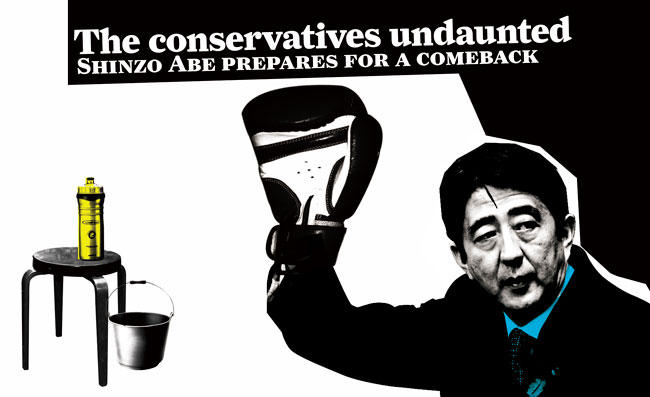Abe Shinzo, former prime minister and favorite of many alliance managers in Washington, was in Washington, D.C. this past week, meeting with Vice President Joe Biden and delivering addresses at the Brookings Institution and the Ocean Policy Research Foundation's US-Japan Seapower Dialogue.
Chris Nelson, eponymous author of The Nelson Report, concluded from Abe's visit that "he sure sounds like he intends to try and come back into power." In other words, consistent with how he became prime minister in the first place, Abe is beginning his comeback tour in a place where he may still enjoy some support.
His Brookings speech may seem like a response to the global financial crisis and a vehicle to soften his image, but Abe said little different from what the Aso government is trying to do, using the economic crisis to promote investment in technological innovation. Abe is still more focused on the distant future than on the dismal present: "However, statesmen also have an obligation to tackle tomorrow's problems. Statesmen have to build systems and projects that will allow their citizens to enjoy benefits over the long term and invest in those systems and projects." He talks about his "Innovation 25" program, but it is unclear what the Japanese government has been able to do to make Japan more innovative and productive. When Abe and others talk about fostering innovation, it strikes me as bordering on technofetishism, a belief that Japan's problems will vanish with technological innovation, which at the same time gives the impression of a certain degree of callousness to the Japanese people who are struggling in the present. Abe is still dreaming of his utsukushii Nihon to come, while the Japanese people continue to live in an increasingly kibishii Nihon.
Nelson noted that Abe came across as more internationalist in his Brookings address, which I guess is true, but for the most part I read it as the same old Abe. The same uneasy balance between a belief in the need for a "mutually-beneficial strategic relationship" with China while stressing the dangers of China's military modernization program. The same blindspot for South Korea, Japan's democratic neighbor. The same uncompromising position on North Korea and the emphasis on the abductees, although with the bizarre modification that the US can talk directly with North Korea as long as it continues to support Japan on the abductions issue. (This was, in a sense, precisely what the US was doing at the end of the Bush administration, pursuing a nuclear bargain in Beijing while the president and other officials assured Japan that it would not forget the abductees. And we saw how well that went over in certain circles in Japan.) He said nothing about constitution revision, although not for lack of belief in its importance.
He also did his part in the campaign to paint Ozawa Ichiro and the DPJ as dangerously irresponsible. Answering a question at Brookings, he said that only if Maehara Seiji becomes prime minister will a DPJ administration not undermine the alliance. As many of his fellow LDP members — and all too many people in Washington — have done, he singled out Ozawa Ichiro's remarks about the US presence in Japan as indicative of some sort of fundamental incoherence on the part of the DPJ, a point which I've previously argued overstates the case. Meanwhile, I find it a bit rich for an LDP politician to bemoan the diversity of opinions within the DPJ, given how consensus has eluded the LDP on numerous policy questions. One day some LDP politician criticizes the DPJ for being Ozawa's personal fiefdom; the next day another criticizes the DPJ for being too diverse in its opinions; the next day another criticizes the party as a reincarnation for the old Socialist Party. Which is it?
Earlier in his trip Abe met with Biden to talk about President Obama's plans for nuclear arms reductions, delivering a message from Prime Minister Aso stating his desire to cooperate with the Obama administration on arms reduction and non-proliferation, although, as Ralph Cossa argued recently, Japan may be less enthusiastic about nuclear arms reductions than meets the eye. To put an exclamation point on Cossa's argument, back in Japan Nakagawa Shoichi, another conservative exiled from power, was delivering a different message about nuclear weapons. Continuing the argument that he and other conservatives have made since North Korea's rocket launch earlier this month, Nakagawa stressed that the only answer for North Korea's nuclear weapons is for Japan to have its own nuclear weapons, an argument that Nakagawa says is "common sense" and not unconstitutional. The nuclear umbrella is apparently not porous, it's non-existent. Why else would Japan need its own nuclear weapons? Can Nakagawa conceive of a situation in which North Korea would strike Japan with nuclear weapons without the US being drawn into the conflict?
Presumably Nakagawa realizes that Japan's acquiring nuclear weapons would be a grave, if not mortal blow to the alliance, and yet he continues to make the argument — how is that somehow less detrimental to the alliance than anything Ozawa has said? There may be no quicker path to an independent Japanese security policy than the acquisition of nuclear weapons, as it is hard to see how the US could maintain the status quo arrangement were Japan wielding its own nukes. Nakagawa may be a disgraced former cabinet member, but he is not alone in making this argument, and the persistence with which conservatives make this argument make it more worrisome. They have a long-term project of making the case for a Japanese nuclear deterrent, and the more their argument goes unanswered, the more respectability it will acquire.
If Aso meant what he said to Obama, he ought to criticize Nakagawa and others publicly and unambiguously for their remarks. This isn't a matter of taboos — they should be able to say whatever they want — but their arguments should not go unanswered. They should be met not with an irrational outcry, but with cool, rational arguments that illustrate the many dangers associated with the policy they are advocating.
Is there no one in the Japanese establishment willing or able to take up Nakagawa's call for a debate on nuclear weapons and then proceed to destroy the idea?
As both Abe and Nakagawa illustrated last week, Japan's conservatives are undaunted in their quest to remake Japan. They continue to wield considerable power, their ideas go largely unchallenged in the public sphere, and they have no shortage of the will to power despite setbacks.
Blog:
Other posts by Tobias Harris:







